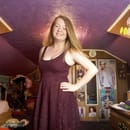In honor of Susquehanna’s #LiveAgainstHate campaign and its Month of Radical Love, Monica Prince, an assistant professor of Creative Writing, hosted a discussion on intersectionality, agency, and activism in the works of James Baldwin and Audre Lorde on Thursday afternoon. Monica was joined by professors Christiana Paradis, Hasanthika Sirisena, Michael Thomas, and Apryl Williams for an afternoon of wonderful discussion that I was lucky enough to attend.
The discussion started with each professor giving their take on the importance of Lorde and Baldwin and the key things they have learned from their works. While they talked, prominent quotes from the readings were displayed on the screens behind them.
Professor Paradis spoke first on the way she first fell in love with Audre Lorde during a class here at SU. She talked about how Lorde first introduced her to the idea of intersectionality. One of the Lorde quotes Professor Paradis shared really stuck out to me. “My silence had not protected me. Your silence will not protect you.”
Paradis is an adjunct professor in Women’s Studies and coordinates the Violence, Intervention and Prevention (V.I.P.) Center on campus, which helps assist victims of sexual, dating, and gender-based violence through counseling and prevention education. The idea of silence is closely associated with victims of violence. Professor Paradis cited this quote and Lorde herself as having a key influence in bringing her to the realization that she needed to start sharing her own story.
When it comes to advocacy, Professor Paradis recommended to start by having conversations and allow that to move you into a space action. She went on to discuss the importance of intersectionality in violence prevention and ended her portion of the panel by saying, “It’s on each and every one of us to speak our truth and tell our stories.”
Professor Sirisena spoke next, reading an essay about Baldwin and Lorde. She focused primarily on Baldwin’s work and how he spoke on rage and forced white people to engage with him and his anger even though it was uncomfortable. She talked about women like Serena Williams being called “hysterical” when they’re angry. She talked about the 11-year-old black boy in Florida who was arrested in his sixth-grade classroom on February 4th when he refused to stand for the pledge of allegiance.
Professor Sirisena encouraged us to ask ourselves what response other than anger would make sense in moments of systematic racism. She told a personal story of the way her father would sometimes turn his anger against the system into anger against his family.
Most notably, Professor Sirisena shared the Baldwin quote, “Love takes off the masks that we fear we cannot live without and know we cannot live within.” She discussed how we oftentimes wear a mask over our anger to hide it from the world, but we shouldn’t hide it, because anger against the system is completely justified and in some ways, beautiful.
Dr. Thomas started by saying that he turned to Baldwin’s work for the same reasons Christians turn to the Bible. He went on to discuss the state of the world we live in, a place where the lynching and murder of black citizens could be justified in the name of the law, homosexuality was considered mental illness, and immigrants constitute a national emergency. He discussed agency and how that requires self-reflection. Dr. Thomas said we all must seek out the blindspots in our experience, the places where we have privilege and may not see the systems working against others. In the end, Dr. Thomas left us with a couple of questions to think over: What is your role in the system of reality in the U.S.? What is your role in the system of reality at SU?
When it was finally Dr. Williams’ turn to speak, she started with the quote from Audre Lorde, “I am a Black Feminist. I mean I recognize that my power as well as my primary oppressions come as a result of my blackness as well as my womaness, and therefore my struggles on both of these fronts are inseparable.” With this, Dr. Williams began discussing intersectionality and how with ideas like these, Lorde had begun discussing it before the word “intersectionality” even existed.
Dr. Williams moved on to try and answer the question, “How do we organize outside our differences?” Her answer was to create a community that is color blind, aware of the differences between us, and aware of intersectionality and all of the ways it functions. She talked about survival in the “Master’s house” which is a reference both to slavery and to the general superstructure of our society as a whole and how “survival is not an academic skill.”
Her ending point was that we all need to put in the effort to educate ourselves rather than expecting others to educate us. Her point was nailed home by the Lorde quote, “Women of today are still being called upon to stretch across the gap of male ignorance and to educate men as to our existence and our needs. This is an old and primary tool of all oppressors to keep the oppressed occupied with the master’s concerns. Now we hear that is the task of women of color to educated white women – in the face of tremendous resistance – as to our existence, our differences, our relative roles in our joint survival. This is a diversion of energies and a tragic repetition of racist patriarchal thought.”
After each of the panelists spoke, the floor was opened to the audience to ask questions of their own about Lorde and Baldwin, as well as intersectionality, agency, and activism. A lot of great topics were discussed at this point, including the modern use of intersectionality and how it oftentimes leaves out the intersections of systems of oppression, tools from outside “the master’s house” that can be used to dismantle it, and ways to use specific language and word choice to increase advocacy and inclusion.
Potentially the most important question that was raised circled back to Dr. Williams point of educating ourselves. Dr. Glen Retief, director of the Creative Writing program, asked, “If someone wants to dive in to readings from Lorde and Baldwin, where should they start?” Dr. Retief himself suggested, A New Spelling of my Name from Lorde and Notes of a Native Son by Baldwin. Each professor on the panel had their own suggestions as well. Dr. Williams recommended Sister Outsider by Lorde. Professor Sirisena endorsed Dr. Retief’s picks and also suggested Fire Next Time by Baldwin. Professor Paradis recommended Transformation of Silence into Language and Action by Lorde and Dr. Thomas chose Nobody Knows My Name from Baldwin.


